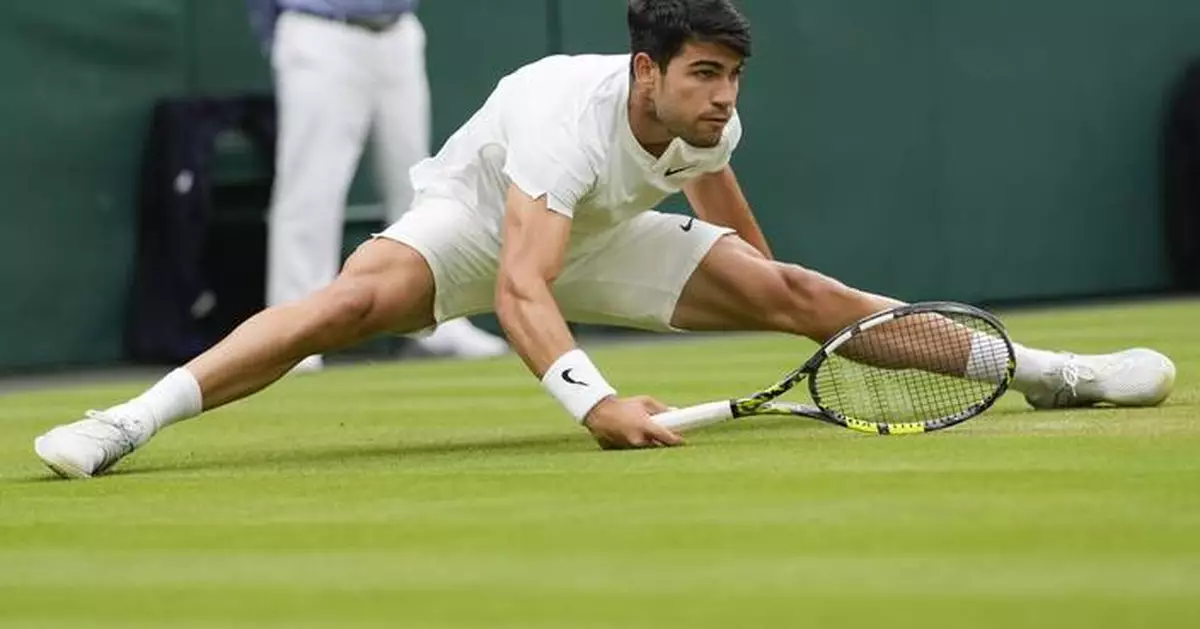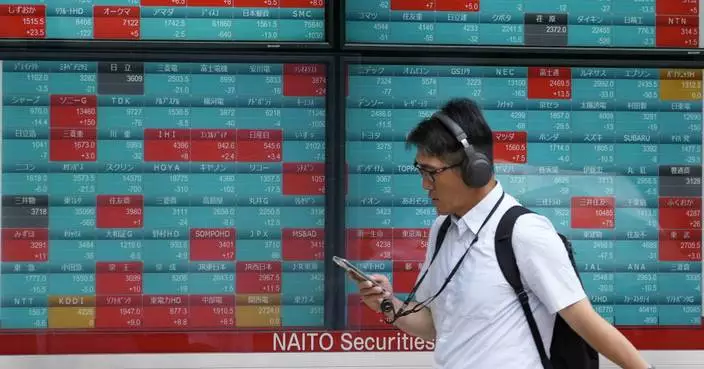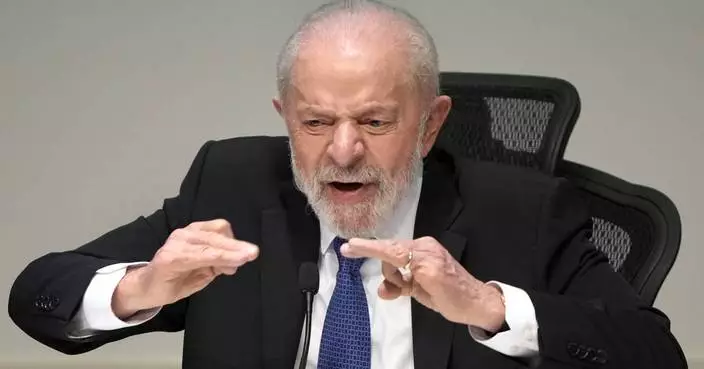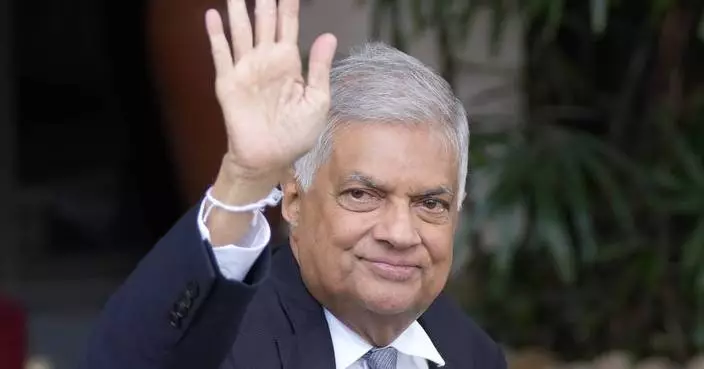LONDON (AP) — Carlos Alcaraz's ability to hit any type of shot, from any position on the court, on any surface, keeps fans on the edge of their seats.
Keeps other players guessing, too.
Click to Gallery
LONDON (AP) — Carlos Alcaraz's ability to hit any type of shot, from any position on the court, on any surface, keeps fans on the edge of their seats.
Lorenzo Musetti of Italy reacts after winning a point against Taylor Fritz of the United States during their quarterfinal match at the Wimbledon tennis championships in London, Wednesday, July 10, 2024. (AP Photo/Mosa'ab Elshamy)
Serbia's Novak Djokovic reacts with with his daughter, Tara, and son, Stefan during a practice session, at the Wimbledon tennis championships in London, Wednesday, July 10, 2024. (John Walton/PA via AP)
Daniil Medvedev of Russia plays a forehand return to Jannik Sinner of Italy during their quarterfinal match at the Wimbledon tennis championships in London, Tuesday, July 9, 2024. (AP Photo/Mosa'ab Elshamy)
Carlos Alcaraz of Spain plays a shot back between his legs to Ugo Humbert of France during their fourth round match at the Wimbledon tennis championships in London, Sunday, July 7, 2024. (AP Photo/Alberto Pezzali)
Carlos Alcaraz of Spain plays a forehand return to Ugo Humbert of France during their fourth round match at the Wimbledon tennis championships in London, Sunday, July 7, 2024. (AP Photo/Alberto Pezzali)
Alcaraz delights in all of that — he loves putting on a show just as much as he enjoys knowing he makes the guys on the other side of the net uncomfortable — and figures it can only help him in the Wimbledon semifinals against Daniil Medvedev on Friday.
It's beneficial, Alcaraz said, that opponents need to focus on whether he'll be “able to be back (in) the point or ... able to hit an unbelievable shot.”
“For me,” he said, “it’s great that they're thinking about it.”
Alcaraz, the No. 3 seed, is seeking a second consecutive trophy at the All England Club and fourth Grand Slam title overall. His triumph last month at the French Open made him, at 21, the youngest man to collect a major trophy on hard, grass and clay courts.
Medvedev, who is seeded No. 5 and defeated No. 1 Jannik Sinner in the quarterfinals, won the 2021 U.S. Open but is just 1-5 in major finals.
The other match Friday will be No. 2 Novak Djokovic, who has won seven of his men's-record 24 Slam championships at Wimbledon, against No. 25 Lorenzo Musetti, making his debut in a major semifinal.
“Against him, you are probably more stressed, because he’s probably the best player ever — or one of the best players ever,” said the 22-year-old Musetti, who beat Taylor Fritz in five sets on Wednesday, while Djokovic got the day off because his foe, Alex de Minaur, withdrew with an injured hip.
“You walk on court with a different mentality,” said Musetti, whose 1-5 record against Djokovic includes a five-set loss at this year's French Open that ended at after 3 a.m. “If I play in a certain way, I could have my shot in the next round.”
Alcaraz vs. Medvedev is a rematch from last year's semifinals, when Alcaraz won in straight sets before getting past Djokovic in the final.
It also offers a contrast between a talented attacker (Alcaraz) and a consummate defender (Medvedev).
“The most difficult thing about facing Daniil, or the most special thing about him, is he can reach every ball,” Alcaraz said. “Well, he is like a wall. Every ball bounces back.”
Asked what Alcaraz's best quality is, Medvedev began this way: “To be honest, everything.”
That sounds like an exaggeration.
Might not be.
“That’s where it’s tough to play against him, because you know whatever shot you hit, he can hit a winner from there. So you try to make his life difficult. You try to hit the shot as good as you can. Maybe he goes for it and he cannot make it,” said Medvedev, who has won just two of their previous six encounters.
“Carlos can do whatever, from any position,” Medvedev said, “and that’s not easy to play against.”
Tommy Paul, the 12th-seeded American who lost to Alcaraz in the quarterfinals, put something else on the lengthy list of the Spaniard's attributes.
“He moves unbelievably well. He’s probably the quickest player. It’s very hard to get the ball by him,” Paul said. “Grass suits him. He moves incredible on the grass. It’s not easy to change direction the way that he does. He stays pretty low. Yeah, I mean, it’s not easy.”
And then, in a nod to the sort of highlight-reel material Alcaraz regularly produces, Paul added: “Half of the job when you’re out there is not to let him win one of those crazy points — because when he does, he kind of gets on a roll.”
Howard Fendrich has been the AP’s tennis writer since 2002. Find his stories here: https://apnews.com/author/howard-fendrich
AP tennis: https://apnews.com/hub/tennis
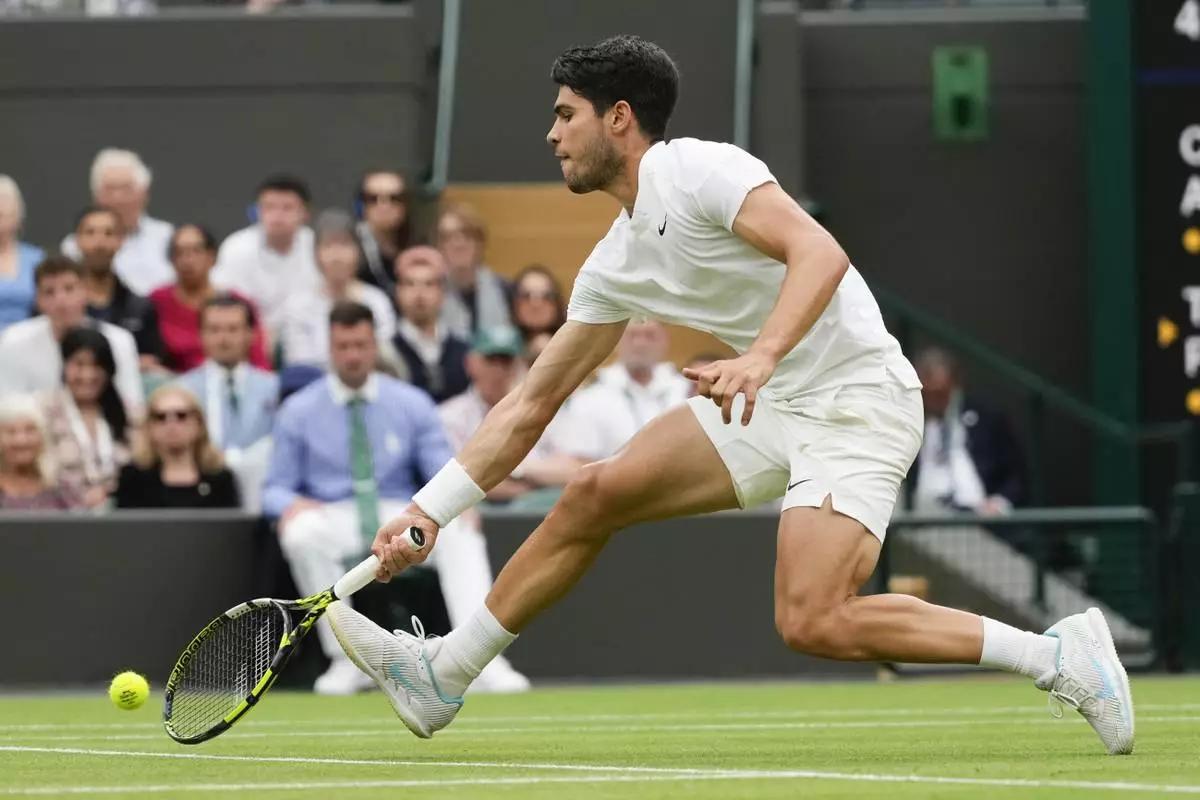
Carlos Alcaraz of Spain plays a forehand return to Tommy Paul of the United States during their quarterfinal match at the Wimbledon tennis championships in London, Tuesday, July 9, 2024. (AP Photo/Kirsty Wigglesworth)

Lorenzo Musetti of Italy reacts after winning a point against Taylor Fritz of the United States during their quarterfinal match at the Wimbledon tennis championships in London, Wednesday, July 10, 2024. (AP Photo/Mosa'ab Elshamy)
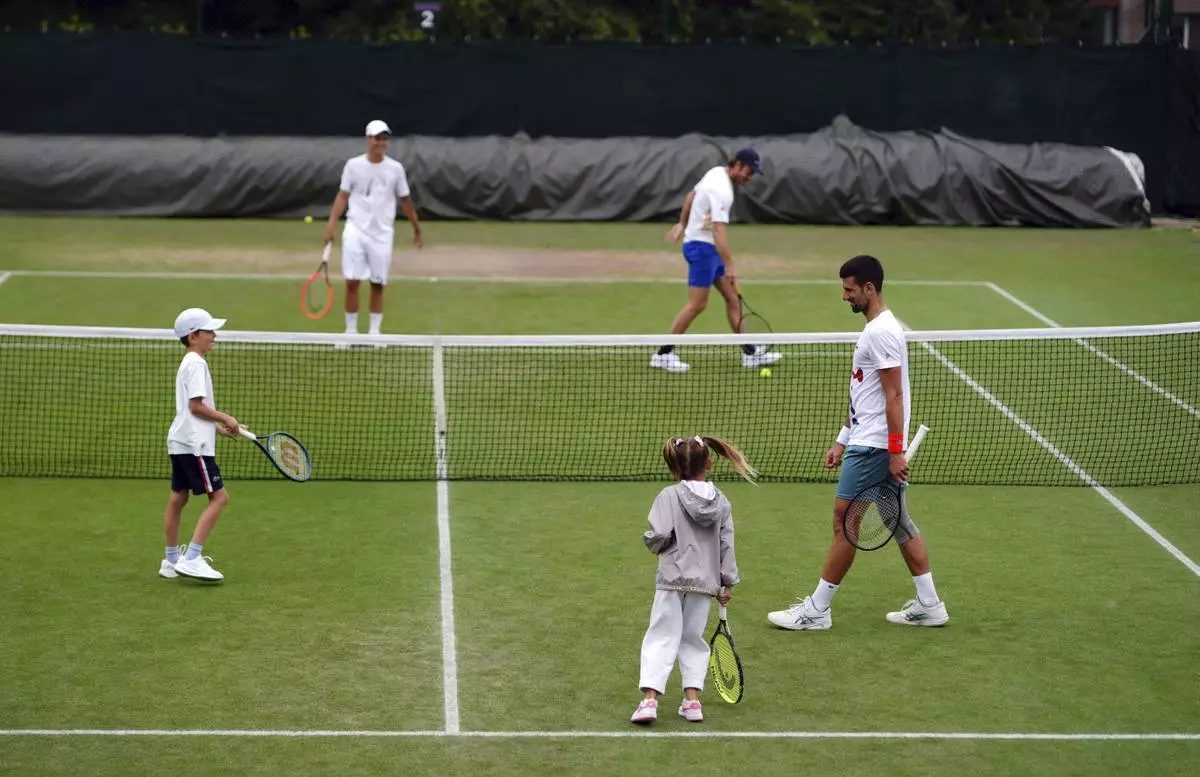
Serbia's Novak Djokovic reacts with with his daughter, Tara, and son, Stefan during a practice session, at the Wimbledon tennis championships in London, Wednesday, July 10, 2024. (John Walton/PA via AP)
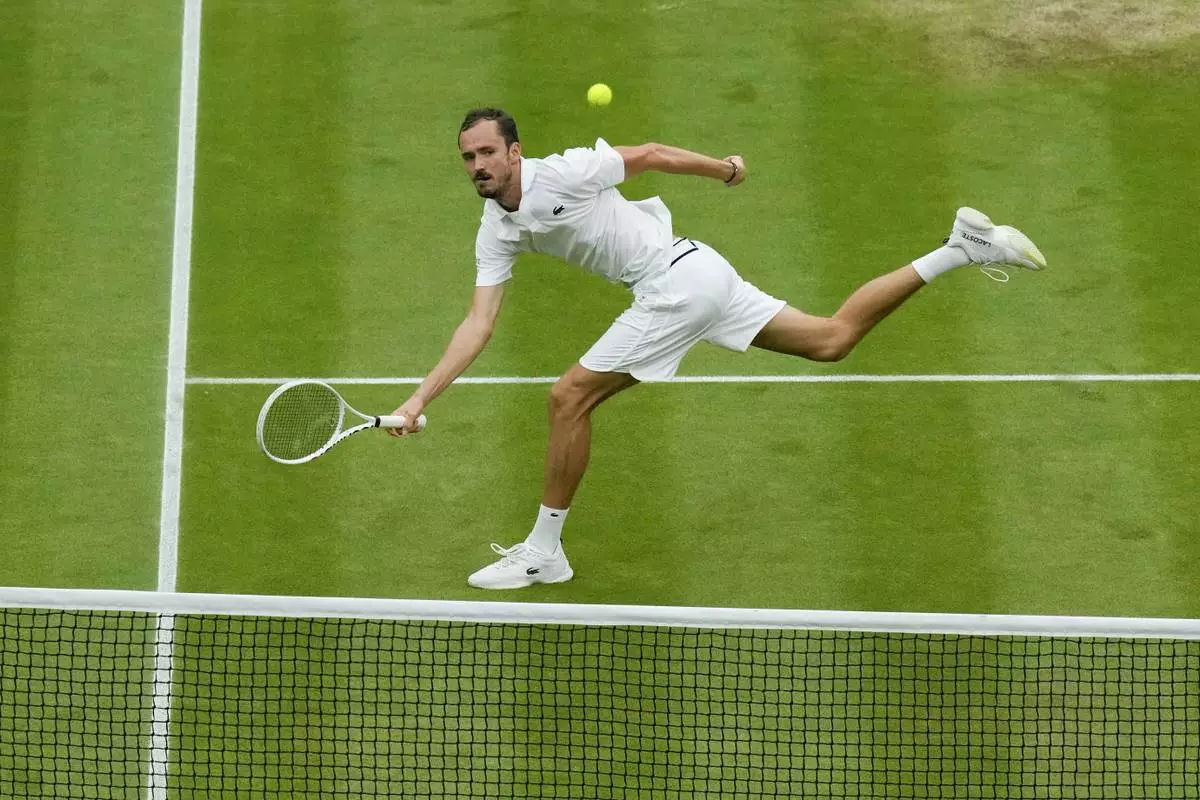
Daniil Medvedev of Russia plays a forehand return to Jannik Sinner of Italy during their quarterfinal match at the Wimbledon tennis championships in London, Tuesday, July 9, 2024. (AP Photo/Mosa'ab Elshamy)
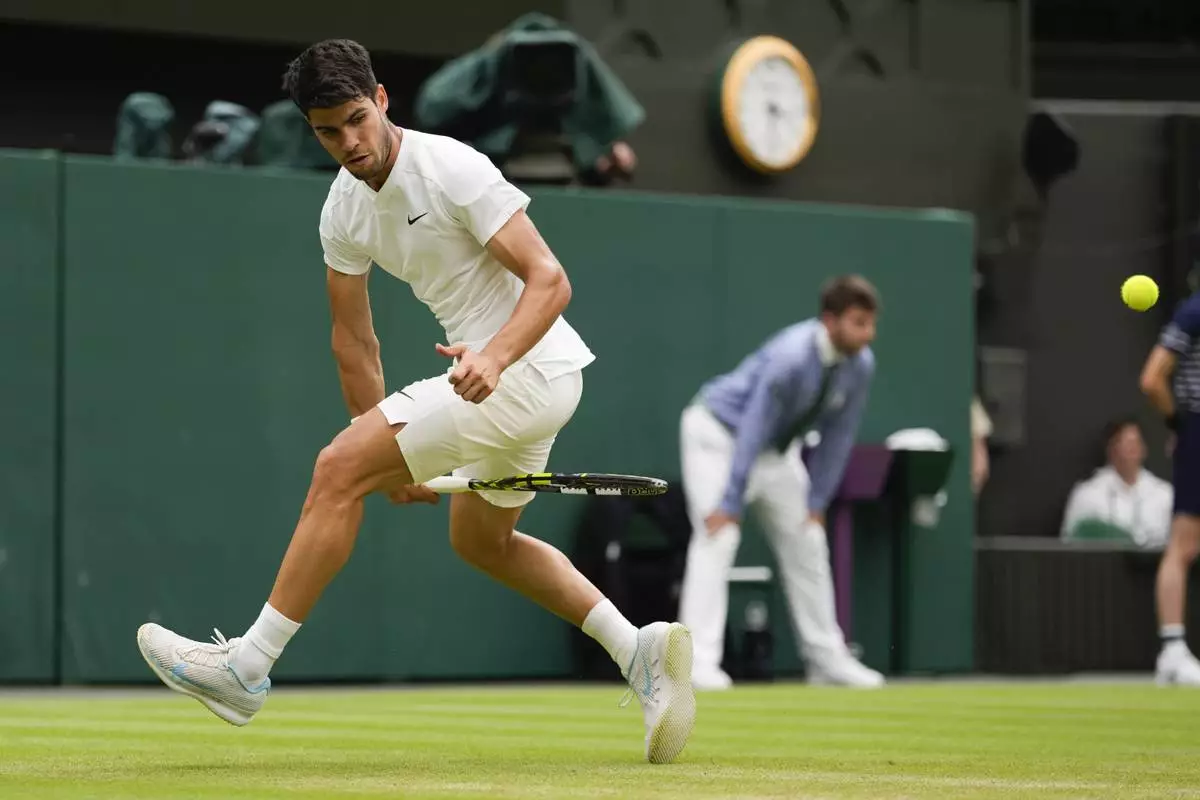
Carlos Alcaraz of Spain plays a shot back between his legs to Ugo Humbert of France during their fourth round match at the Wimbledon tennis championships in London, Sunday, July 7, 2024. (AP Photo/Alberto Pezzali)
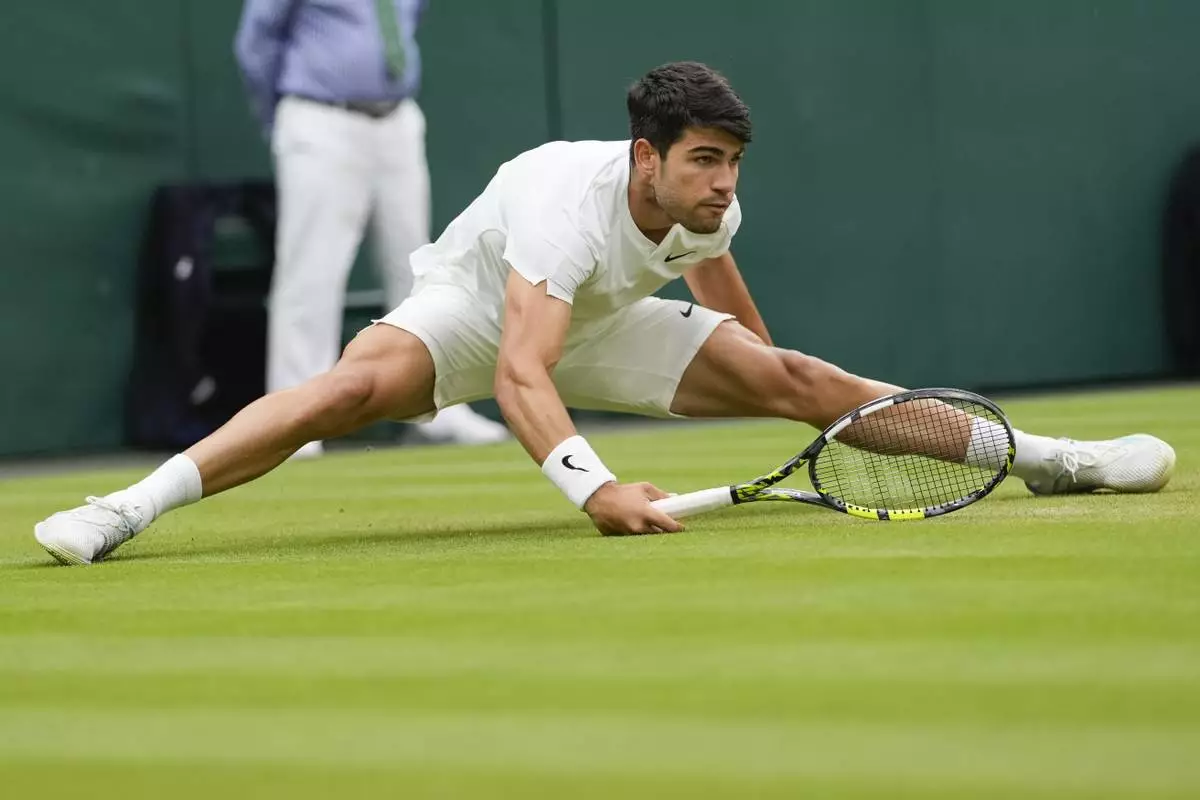
Carlos Alcaraz of Spain plays a forehand return to Ugo Humbert of France during their fourth round match at the Wimbledon tennis championships in London, Sunday, July 7, 2024. (AP Photo/Alberto Pezzali)
BANGKOK (AP) — Wednesday’s decision by Thailand’s Constitutional Court to oust Prime Minister Srettha Thavisin after just under a year in office was jarring, but not entirely a surprise given what critics say is the expanding overreach of unelected bodies.
Thais have long been accustomed to sudden changes of government due to military coups, numbering more than a dozen since the 1930s. But in the past two decades, they have increasingly seen such changes imposed by the courts, which have ousted four prime ministers and dissolved three election-winning political parties, often on narrow technical grounds.
In most cases the targets were viewed as challengers to the traditional royalist establishment, whose most powerful defenders are the army and the courts.
Other nominally independent state bodies such as the Election Commission and the National Anti-Corruption Commission also have controversially exercised constitutional powers to purge officeholders.
Wednesday’s court ruling ousted Srettha Thavisin for breaching a law on ethical behavior by appointing a Cabinet member who had gone to prison in a 2008 case involving an alleged attempt to bribe a judge.
“The Constitutional Court’s decision to dismiss Prime Minister Srettha Thavisin and his entire Cabinet exemplifies the overreach of undemocratic institutions within Thai politics and public life,” said Mookdapa Yangyuenpradorn, a human rights associate at the Fortify Rights group.
“This ruling is not an isolated incident but instead reflects a troubling pattern of unelected officials wielding disproportionate power over elected political leaders," she said.
The ruling was the court’s second major exercise of political power in about a week.
On Aug. 7, it dissolved the progressive Move Forward Party, which won the most seats in last year’s election but was blocked from taking power when it could not secure the support of another conservative institution, the Senate, whose members refused to endorse its candidate for prime minister.
The court said the party violated the constitution by proposing to amend a law against defaming the country’s royal family, which it said amounted to an attempt to overthrow the nation’s constitutional monarchy.
Prajak Kongkirati, a political scientist at Bangkok’s Thammasat University, described the court’s actions as “judicial coups.”
“The judiciary cemented its power over the legislative branch when they ruled against amending a law, and over the executive branch with the removal of the head of government over the appointment of one minister,” he told The Associated Press. Its rulings upset “the usual checks and balances in a democratic system," and show that Thailand is not a democracy, he said.
A reformist 1997 constitution underlined the independence of agencies and courts in a way that was intended to strengthen democracy by combating money politics that fostered corruption. The courts, especially the Constitutional Court, were supposed to serve as ultimate, nonpartisan arbiters.
However, these bodies in 21st century Thailand have been accused of using laws to cripple or crush opponents of the royalist establishment. A 2017 constitution enacted under a royalist military junta only strengthened their powers.
Khemthong Tonsakulrungruang, a Thai constitutional law expert, wrote last year in the New Mandala blog, that the Election Commission and the Constitutional Court have engaged in “heavy-handed” intervention in Thai politics. They're known to be biased in favor of the military, and against the “democratic camp,” Khemthong said.
“They’ve become a potent weapon to harass a democratic leader," he said.
The royalist establishment opposes any group suspected of disloyalty to the country's monarchy. Its main target over the past couple of decades has been the political machine of former Prime Minister Thaksin Shinawatra, though in recent years it also has gone against a new progressive political movement with no ties to Thaksin.
Thaksin, a telecoms billionaire who formed his own Thai Rak Thai political party and promoted innovative populist policies to sweep to power in 2001, was ousted by a military coup in 2006, accused of abuse of power and corruption, as well as disrespect toward then-King Bhumibol Adulyadej.
His ouster sharply polarized Thai politics, setting off years of contention between his supporters and opponents, sometimes violently in the streets, at the ballot box and in the courts.
Since his ouster, his Thai Rak Thai Party was dissolved in 2007 for violations of election laws, and its successor, the People’s Power Party, made a political comeback but was dissolved in 2008, after its deputy chairman was convicted of electoral fraud.
Two of the People's Power Party prime ministers came and went in quick succession. One of them, Samak Sundaravej, was ousted when the Constitutional Court found he violated a conflict of interest law by continuing to accept nominal pay for hosting a TV cooking show.
Thaksin’s forces in the 2011 general election staged another political comeback, in their third incarnation as the Pheu Thai Party, with Thaksin’s sister Yingluck Shinawatra, taking the post of prime minister.
Aggressive street protests undermined her authority, and in May 2014, the Constitutional Court forced her out of office when it found her guilty of abuse of power for transferring a senior civil servant. A few weeks later her Pheu Thai government was ousted by a military coup.
In 2020, the Constitutional Court dissolved the Future Forward party, a new progressive party that won the third highest popular vote in the 2019 election. The court ruled that it had violated a law on donations to political parties. As in the other party dissolution cases, its executives were served with bans on political activities for several years.
The party was reconstituted as the Move Forward party, which suffered a similar fate earlier this month but quickly reconstituted itself under the name of the People’s Party.
“In what kind of democracy is a court, endorsed directly or indirectly by coup makers, given the power to disenfranchise 14 million voters by dissolving their chosen party and unseat a democratically elected prime minister, all within one week?” Napon Jatusripitak, a political science researcher at Singapore’s ISEAS-Yusof Ishak Institute, said in reaction to the court’s most recent actions.
Its rulings, he said, “remind us that entrenched institutions continue to check the power of elected forces in Thailand. Until a broader consensus is reached on their overreach, no real democracy can take root in Thailand.”
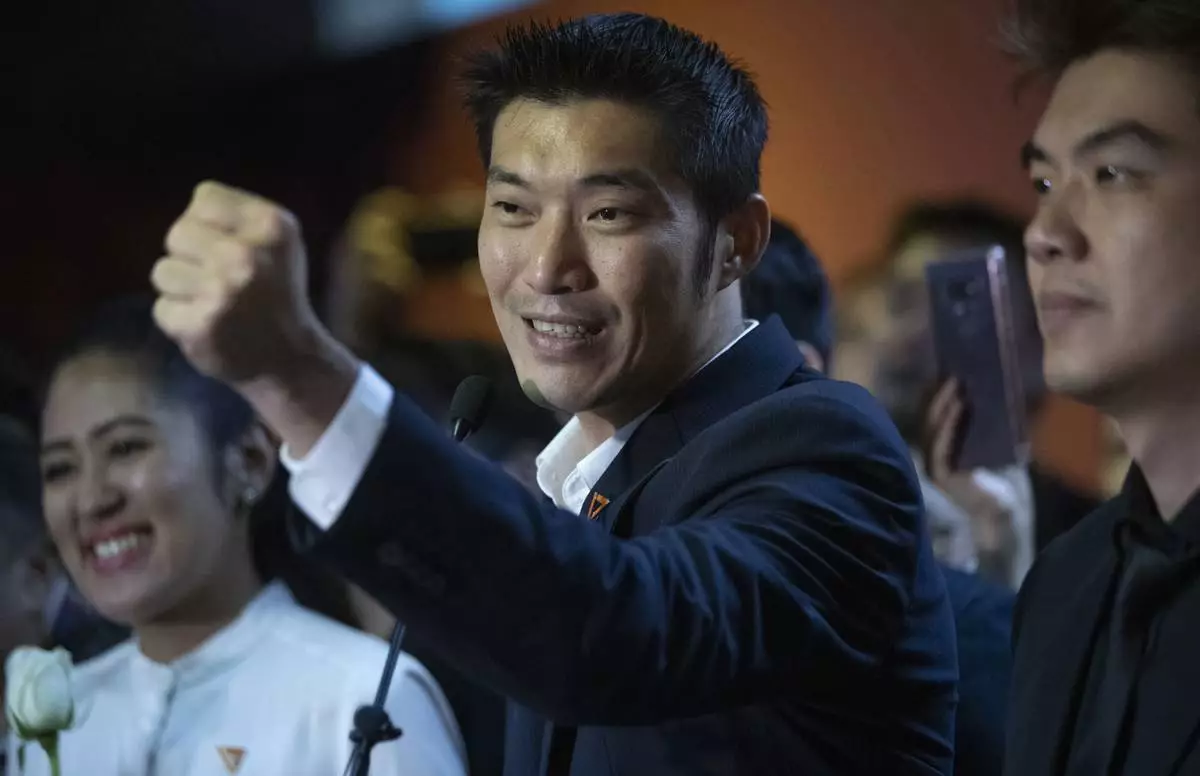
FILE - Thailand's Future Forward Party leader Thanathorn Juangroongruangkit, center, talks to media during a press conference at the party's headquarters in Bangkok, Thailand, on Jan. 21, 2020. (AP Photo/Sakchai Lalit, File)
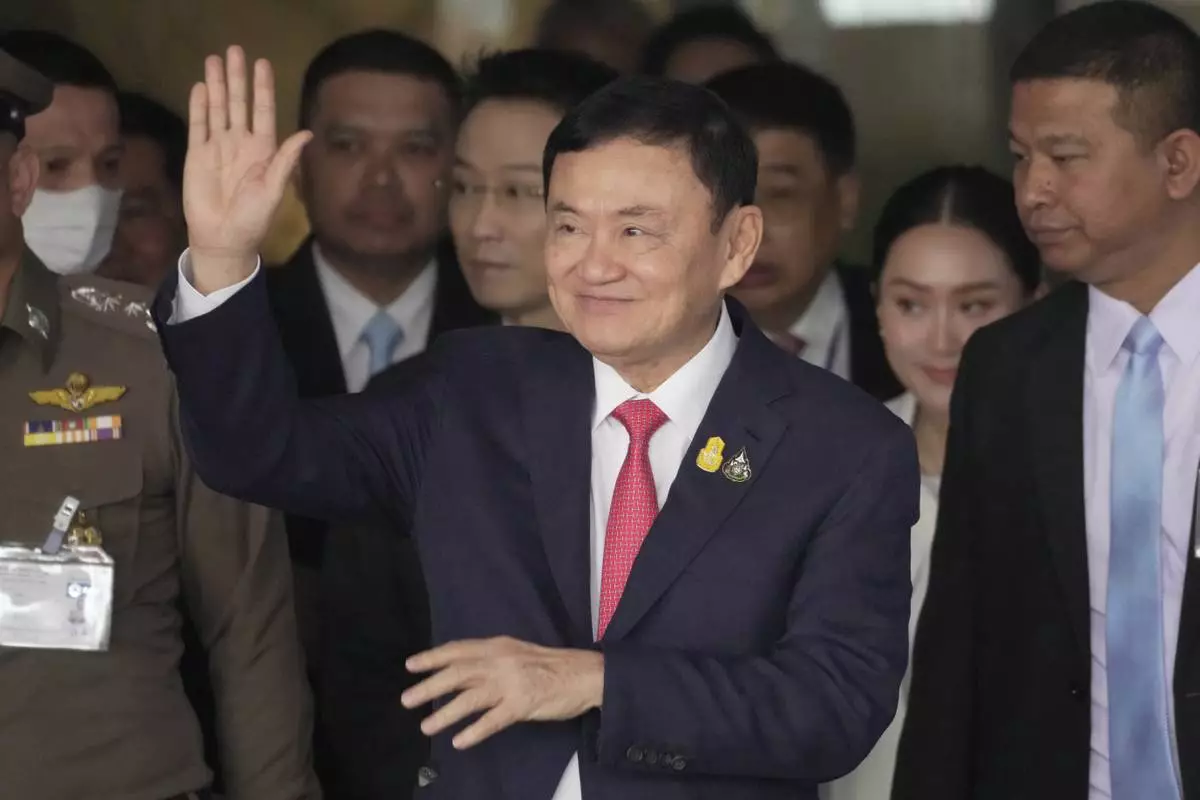
FILE - Former Prime Minister Thaksin Shinawatra, center, arrives at Don Muang airport in Bangkok, Thailand, on Aug. 22, 2023. (AP Photo/Sakchai Lalit, File)
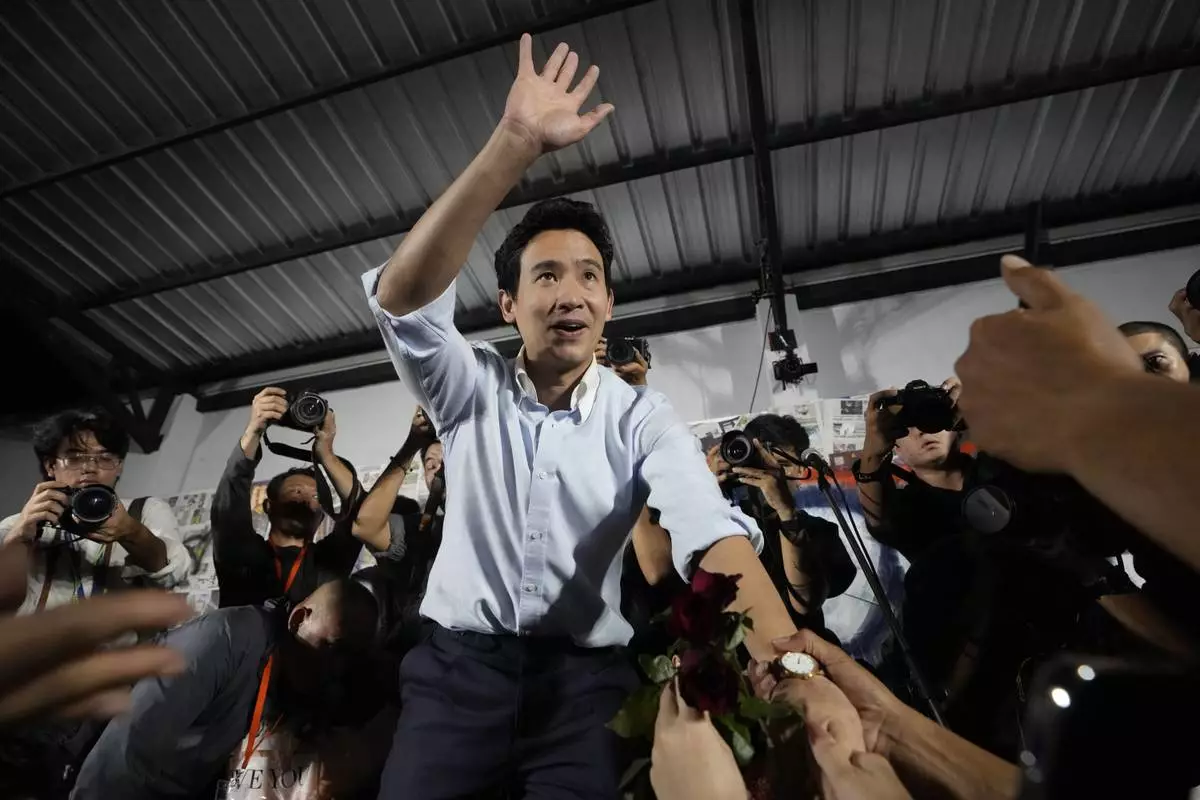
FILE - Former leader of Move Forward Party, Pita Limjaroenrat, center, shakes hands with his supporters at the party's headquarters in Bangkok, Thailand, on Aug. 7, 2024. (AP Photo/Sakchai Lalit, File)

FILE - Thailand's new Prime Minister Samak Sundaravej exits his residence in Bangkok, Thailand, on Jan. 29, 2008. (AP Photo/Sakchai Lalit, File)
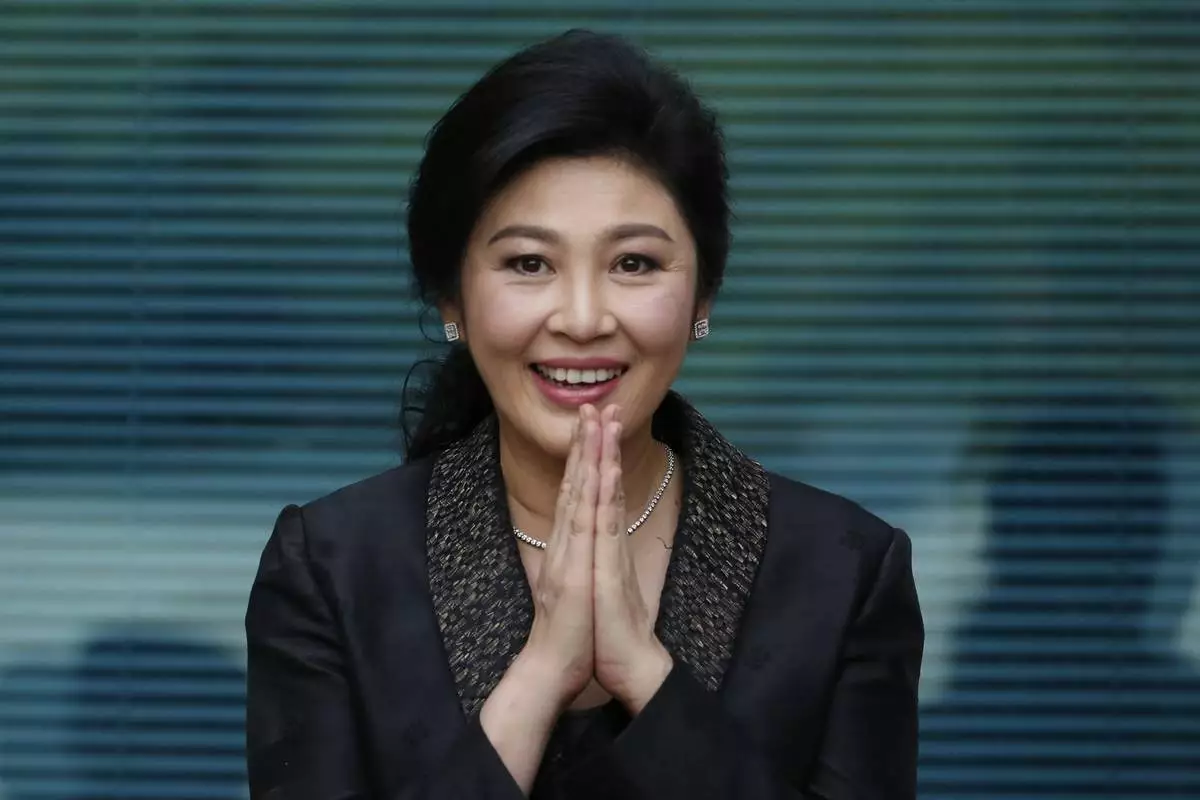
FILE - Thailand's former Prime Minister Yingluck Shinawatra arrives at the Supreme Court to make her final statements in a trial on a charge of criminal negligence in Bangkok, Thailand, on Aug. 1, 2017. (AP Photo/Sakchai Lalit, File)
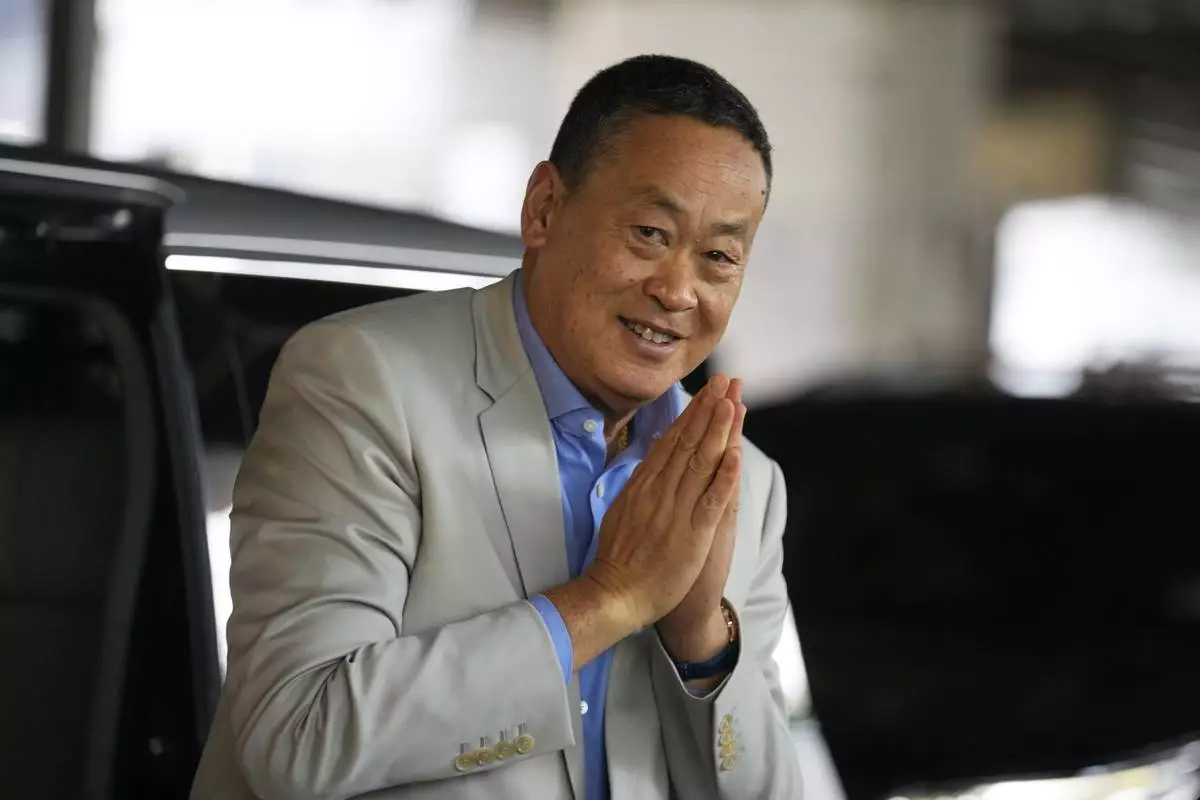
FILE - Thai Prime Minister Srettha Thavisin arrives at Ploenchit market in Bangkok, Thailand, on Aug. 14, 2024. (AP Photo/Sakchai Lalit, File)
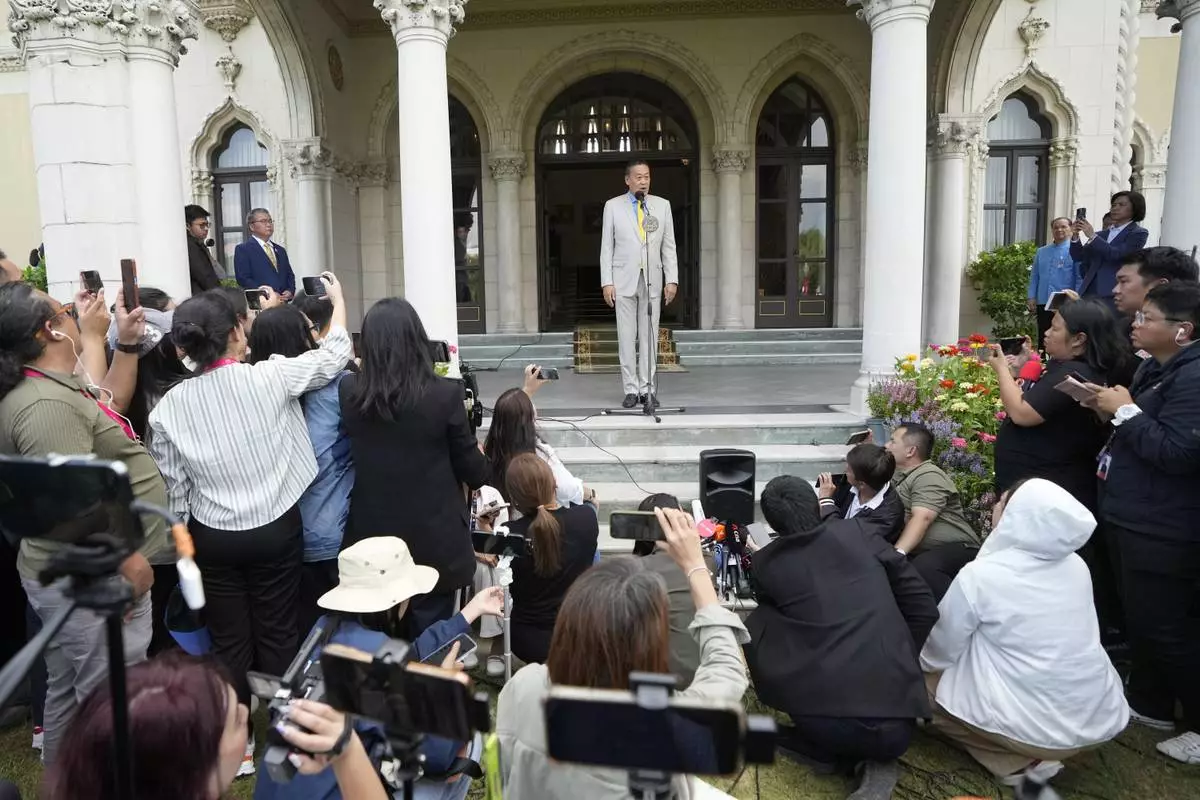
Thai Prime Minister Srettha Thavisin, center, talks to reporters during a press conference at Government house in Bangkok, Thailand after a court removed Srettha from office over an ethical violation Wednesday, Aug. 14, 2024. (AP Photo/Sakchai Lalit)
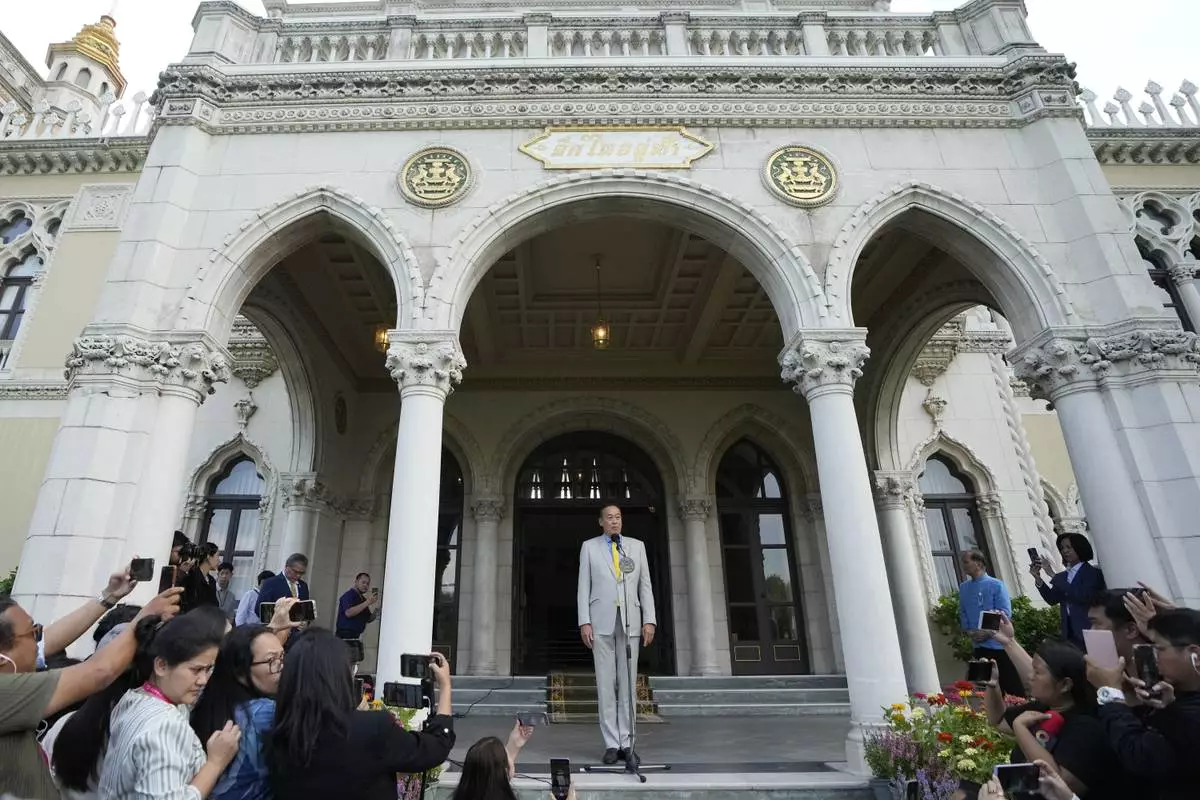
Thai Prime Minister Srettha Thavisin, center, talks to reporters during a press conference at Government house in Bangkok, Thailand after a court removed Srettha from office over an ethical violation Wednesday, Aug. 14, 2024. (AP Photo/Sakchai Lalit)








